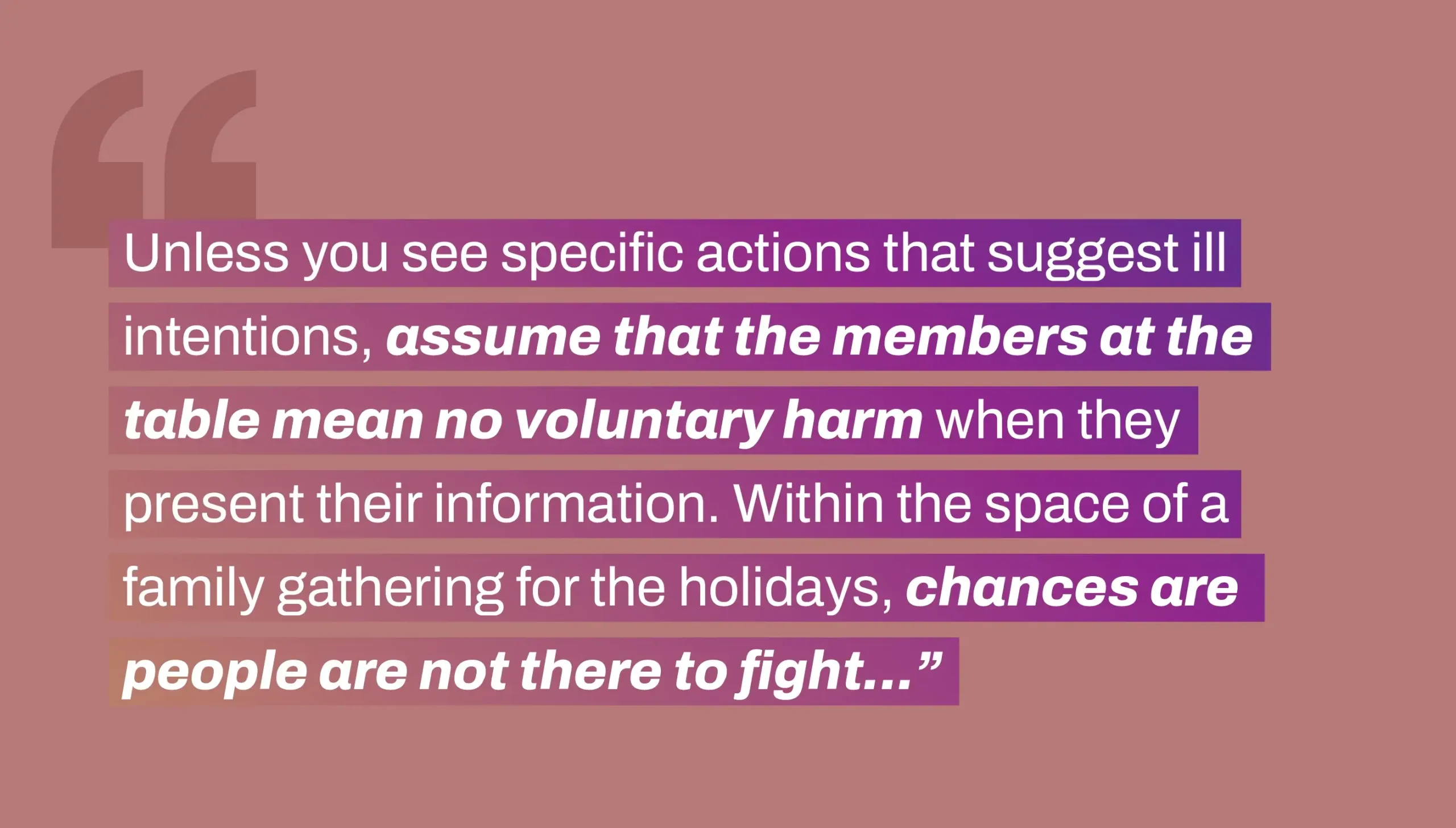For many individuals in recent times, gathering at the dinner table has been corrupted by polarizing topics of conversation that often lead to toxic dialogue. Politics, in particular, have been an alarming source of feuding, as mentioned by Tovia Smith in a 2020 episode of NPR’s All Things Considered: “A recent survey shows just how much the nation’s bitter political divide is causing social splintering and taking a toll on friendships. Even decades-long relationships have been caving under the pressure, giving new meaning to ‘social distancing.'” With the coupling of social connections and nourishment, the dinner table is a cornerstone of well-being. Here are five ways to combat toxicity and reclaim the dinner table as a safe and healthy space during the holidays.
1. Remember Your Core Values and Live Them Out
In a conversation that goes awry, we can quickly get caught up in the moment and forget to live out our core values. Hostile environments send our bodies into fight, freeze, or flight. This state of mind creates a tunnel vision that constricts our ability to focus on matters besides the conflict. For these reasons, consider reviewing your core values before dinner to prime you for the behavior you want to embody. This way, if and when a toxic conversation emerges, you are more empowered to stand up and passionately communicate on behalf of your ideals. If a situation arises in which you may have to sacrifice the peace at the gathering in favor of staying true to your personal core values, then you can and ought to sacrifice the peace without remorse. You may be shamed by the other members for your actions, but that is entirely more tolerable than leaving the meal with a personal sense of guilt for abandoning your core values.
2. Contemplate First; React Second
If you want to have as healthy a conversation as possible, engage in welcoming and compassionate behavior, no matter what kind of energy and information is projected onto you. Do your best to actively listen with the intent to comprehend the current speaker’s words fully. This also means that while you are actively listening you arent pre-planning your rebuttal in your mind. Before you respond, contemplate what is being said and consider reiterating what you gathered from the speaker to show them that you genuinely want to understand and hear them out. For instance, “What I’m hearing you say is… am I understanding your point in the way you meant it?” When you share, ensure you are coherent in what you are saying to make sure others will be able to understand, even if the topic is emotionally triggering. If you need time to feel or process the emotions that are bound to come up in these discussions, take that time and communicate your thoughts when you are ready and able to be heard.

3. Forget Your Ego; Focus on Collective Growth and Goals
In a potentially toxic conversation at the gathering, it may be helpful to diminish your ego and take on the role of an advocate for your dinner members. Again, when conflict arises, it can be easy for our minds to feel threatened and attacked, especially for those with strong egos. By becoming an advocate for your relatives, you show them that you are not there to make a fool of them so that you can feel good about yourself, but rather, you show them you are there to connect and foster growth. It is entirely acceptable at times to speak hurtful truths to help your loved ones develop into better humans, but make sure you are communicating for their betterment and not for an ego trip.
4. Assume Positive Intent
Assessing someone’s intentions can be tricky, considering there is no way to be inside someone’s mind. Unless you see specific actions that suggest ill intentions, assume that the members at the table mean no voluntary harm when they present their information. Within the space of a family gathering for the holidays, chances are people are not there to fight. Assuming the speakers have good intentions makes it more likely that you do not falsely assume negative intentions. Humans are prone to falling for confirmation bias. If you believe beforehand that your relatives or group members are there with bad intentions, you are more likely to pay attention to information that confirms you are right and ignore the information that proves you wrong. Assume positive intentions unless proven otherwise.
5. Bring Vulnerability and Compassion to the Table, Not Opinions
While your opinion may seem reasonable, they are not worth much to the table if you come across as someone lacking vulnerability and compassion. Vulnerability is a powerful tool for lowering hostility. Consider a pet cat that shows physical vulnerability when lying down and exposing its stomach to someone. Is it not endearing to know that that being is feeling safe in your presence?
Additionally, showing compassion can be healing to yourself, to your relatives, and to the conversation as a whole. The field of positive psychology has shown compassion to provide a myriad of benefits, including promoting social well-being and reducing stress. If you want to build bridges within a toxic dinner table conversation, compassion is vital.

For many of us still healing from past dinner table hostility, preventing some type of conflict may be difficult for upcoming gatherings. However, conflict does not have to equate to a toxic outcome. As Tovia Smith pointed out, “It’s more conversation—not less—that’s needed if the nation is to heal its blistering divide. But it has to be a healthy, productive conversation.” With these tools at your disposal, you can take control of and restore the dinner table as a place of harmony, meaningful connection, and well-being.





